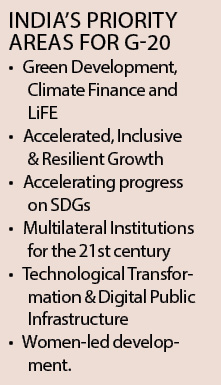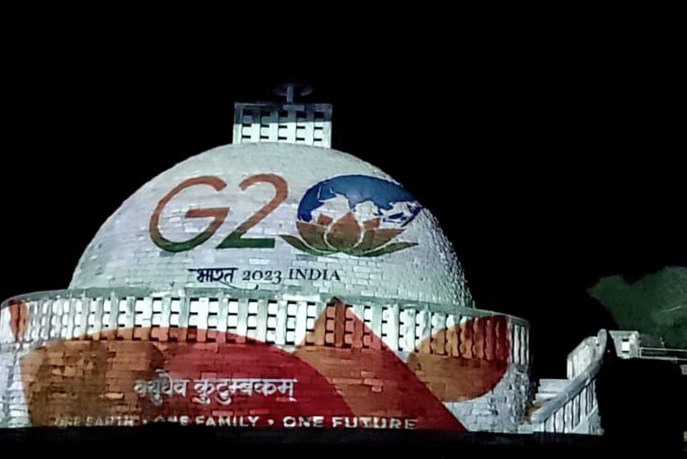India has assumed the Presidency of the Group of Twenty (G20) for the first time. This is undoubtedly a great moment for the country, but not the only one for which India extended leadership to the Global South. India is a strong voice of the developing world, and, therefore, assuming the chairmanship of the G20 offers several implications. In one year or so, India will host over 200 meetings in over 50 cities across 32 different work streams and will hand over the chairmanship towards the end of 2023 to the next Chair—Brazil. This is no exaggeration to say that the Indian government’s ability to think innovatively has put India at the top.

The theme of India’s G20 Presidency is rightly drawn from the ancient Sanskrit text of the Maha Upanishad, titled, “Vasudhaiva Kutumbakam” or “One Earth, One Family, One Future”. The entire organizational process has been planned well in advance and so far, executed brilliantly. India as a chair will have to steer the G20 agenda for one year, host the Summit and hand over the baton to the next leader, Brazil.
The G20 started its journey in 1999 after the Asian financial crisis as a forum for the Finance Ministers and Central Bank Governors to discuss global economic and financial issues. It was upgraded to the level of Heads of State/Government in the wake of the global financial crisis of 2007. Gradually, it has become one of the lead forums for international economic cooperation.
From Asia, there are a total five countries, namely, China, India, Indonesia, Japan and Korea, and, barring India, all of them had organised the summits in the past. These five Asian peers offer high values in terms of trade, technology and natural resources on the G20 desk.
India’s G20 priorities are in these areas: Green Development, Climate Finance and LiFE; Accelerated, Inclusive & Resilient Growth; Accelerating progress on SDGs; Multilateral Institutions for the 21st century; Technological Transformation & Digital Public Infrastructure; and Women-led development. These are non-binding economic issues: learning from each other and sharing information and best practices.
To me, the most interesting one is multilateral institutions for the 21st century. India and many Southern partners require reformed multilateralism as an enabling condition for their growth and global voice. A multipolar world needs an inclusive, transparent and equitable multilateral world. Falling short of it means we encourage a narrow and divided world.
Why is participation in the G20 forum so important? This forum of 19 countries and the European Union together represent a substantial part of global income, trade and population.
What does the G20 offer to the host country? Indonesia’s experience tells us three explicit gains: greater motivation for domestic reforms, scope of both ways trade and technology cooperation, and push for political leadership.
Nonetheless, how much will the G20 help address India’s own economic issues? The past three years in this pandemic phase have seen major changes in India’s economic policies, marking a new phase in India’s development strategy in general and foreign policy in particular. Today’s Indian economy is much balanced; reforms are deeply-rooted; and there is greater involvement of the private sector in running the country. However, the challenges are more than opportunities and in many cases, India is the victim but not directly part of the global crises. In general, India’s approach to global headwinds is gradualism and evolutionary transition rather than rapid restructuring. Moving slowly, but steadily. Today, India faces huge challenges in fiscal stabilization, which is precondition for the success of reforms and growth. Introduction of the GST and transparency and governance have fetched good revenue. This is a path-breaking achievement, but India, on the other hand, is yet to make headway in reducing regional disparity among states. While western and southern states have grown faster, eastern and north-eastern states have fallen behind. India’s landlocked states fall in between. There is an enormous challenge for the Union Government to narrow the gap between the Centre and the States. Infrastructure has been improved, but there is a lot to be done in building the country’s “quality” infrastructure. India’s economic corridors are restricted to the prosperous regions only. Further tax reforms are a must, but we should avoid economic distortions. In two areas India is yet to pick up the global thread: industrial policy and trade policy. We have rather looked inward in recent years, and at the same time we seek the FDI for integrating into the GVC. This does not go well and is not in sync with what India aspires to do under the G20. Well, the G20 is not the panacea for everything. But, aligning the priorities with our needs may offer a “politically” correct strategy.
Come September, once the initial euphoria following the G20 Presidency subsides, it is imperative to remind our people of what they have gained.
Prabir De is Professor with the Research and Information System in Developing Countries (RIS), New Delhi. Views are personal.

